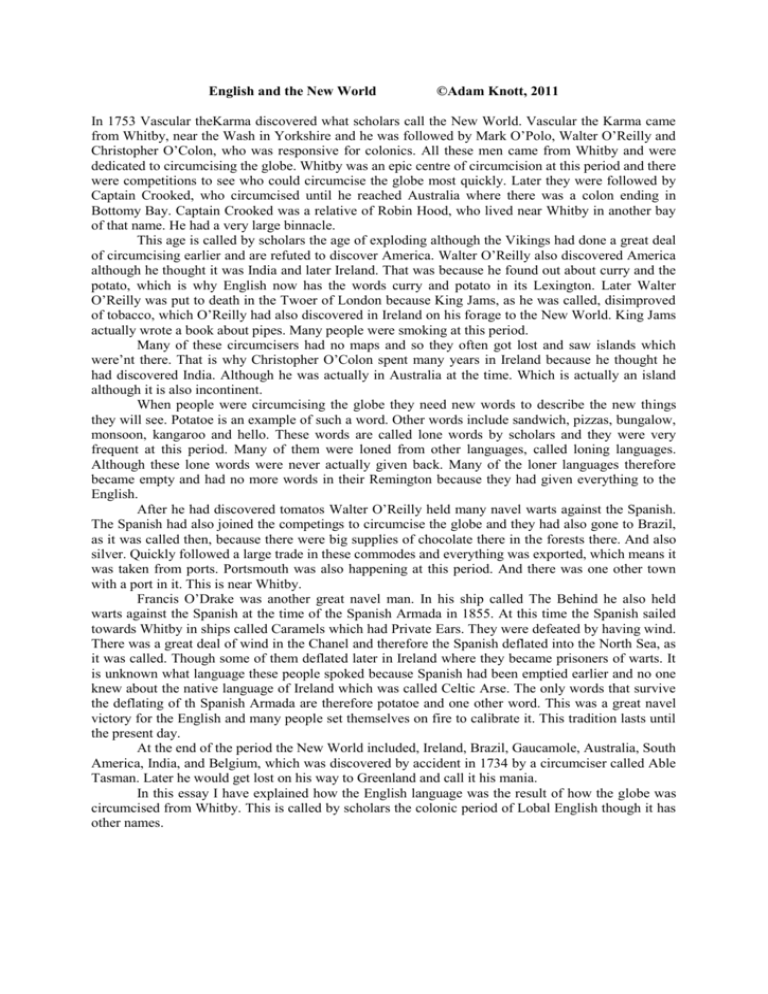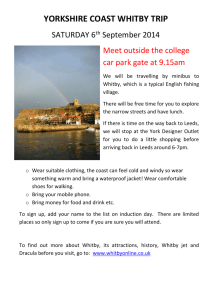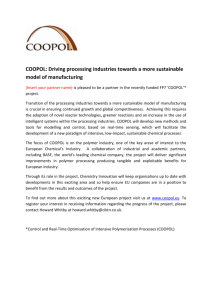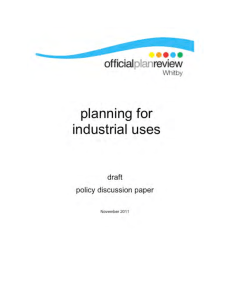English and the New World
advertisement

English and the New World ©Adam Knott, 2011 In 1753 Vascular theKarma discovered what scholars call the New World. Vascular the Karma came from Whitby, near the Wash in Yorkshire and he was followed by Mark O’Polo, Walter O’Reilly and Christopher O’Colon, who was responsive for colonics. All these men came from Whitby and were dedicated to circumcising the globe. Whitby was an epic centre of circumcision at this period and there were competitions to see who could circumcise the globe most quickly. Later they were followed by Captain Crooked, who circumcised until he reached Australia where there was a colon ending in Bottomy Bay. Captain Crooked was a relative of Robin Hood, who lived near Whitby in another bay of that name. He had a very large binnacle. This age is called by scholars the age of exploding although the Vikings had done a great deal of circumcising earlier and are refuted to discover America. Walter O’Reilly also discovered America although he thought it was India and later Ireland. That was because he found out about curry and the potato, which is why English now has the words curry and potato in its Lexington. Later Walter O’Reilly was put to death in the Twoer of London because King Jams, as he was called, disimproved of tobacco, which O’Reilly had also discovered in Ireland on his forage to the New World. King Jams actually wrote a book about pipes. Many people were smoking at this period. Many of these circumcisers had no maps and so they often got lost and saw islands which were’nt there. That is why Christopher O’Colon spent many years in Ireland because he thought he had discovered India. Although he was actually in Australia at the time. Which is actually an island although it is also incontinent. When people were circumcising the globe they need new words to describe the new things they will see. Potatoe is an example of such a word. Other words include sandwich, pizzas, bungalow, monsoon, kangaroo and hello. These words are called lone words by scholars and they were very frequent at this period. Many of them were loned from other languages, called loning languages. Although these lone words were never actually given back. Many of the loner languages therefore became empty and had no more words in their Remington because they had given everything to the English. After he had discovered tomatos Walter O’Reilly held many navel warts against the Spanish. The Spanish had also joined the competings to circumcise the globe and they had also gone to Brazil, as it was called then, because there were big supplies of chocolate there in the forests there. And also silver. Quickly followed a large trade in these commodes and everything was exported, which means it was taken from ports. Portsmouth was also happening at this period. And there was one other town with a port in it. This is near Whitby. Francis O’Drake was another great navel man. In his ship called The Behind he also held warts against the Spanish at the time of the Spanish Armada in 1855. At this time the Spanish sailed towards Whitby in ships called Caramels which had Private Ears. They were defeated by having wind. There was a great deal of wind in the Chanel and therefore the Spanish deflated into the North Sea, as it was called. Though some of them deflated later in Ireland where they became prisoners of warts. It is unknown what language these people spoked because Spanish had been emptied earlier and no one knew about the native language of Ireland which was called Celtic Arse. The only words that survive the deflating of th Spanish Armada are therefore potatoe and one other word. This was a great navel victory for the English and many people set themselves on fire to calibrate it. This tradition lasts until the present day. At the end of the period the New World included, Ireland, Brazil, Gaucamole, Australia, South America, India, and Belgium, which was discovered by accident in 1734 by a circumciser called Able Tasman. Later he would get lost on his way to Greenland and call it his mania. In this essay I have explained how the English language was the result of how the globe was circumcised from Whitby. This is called by scholars the colonic period of Lobal English though it has other names.









